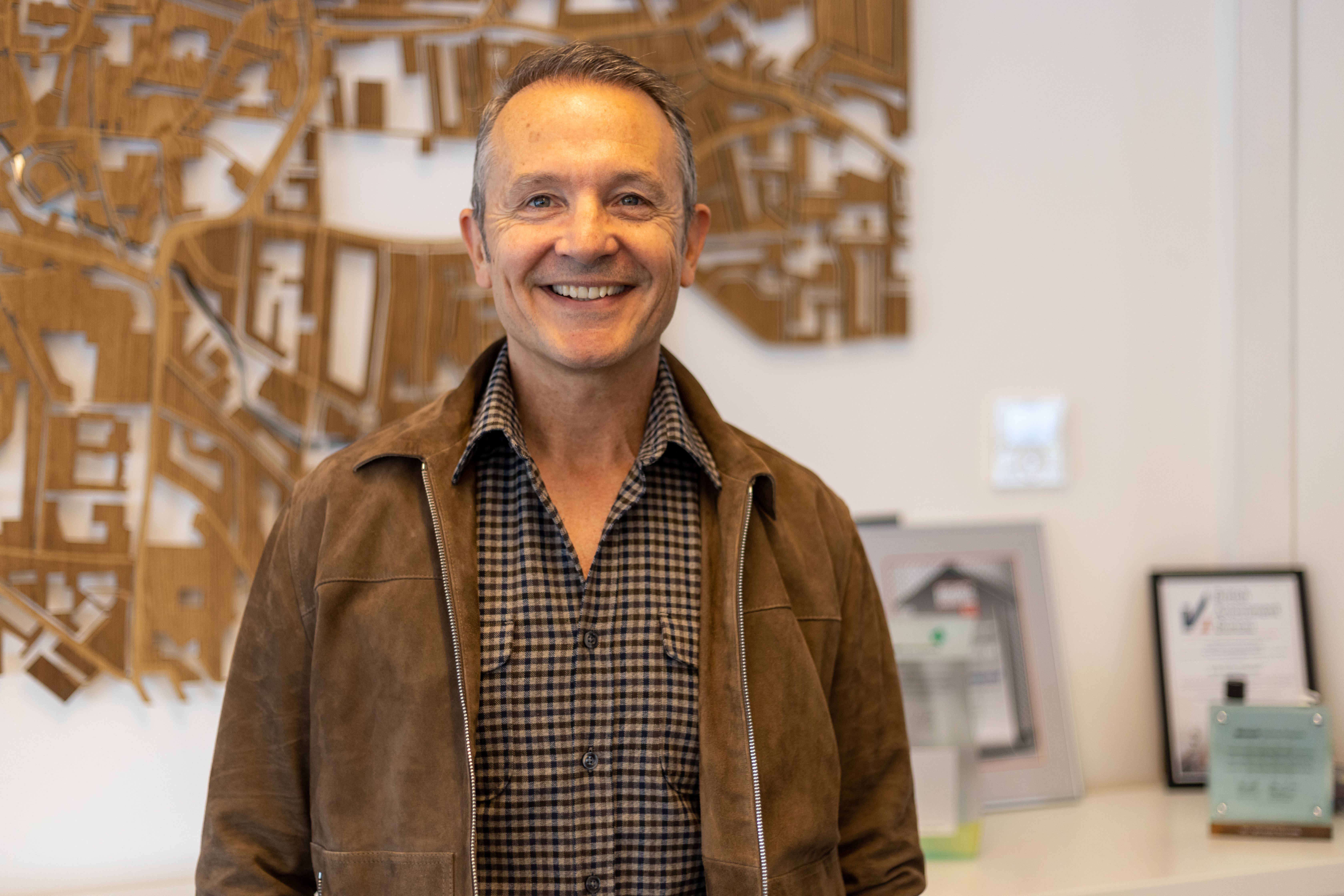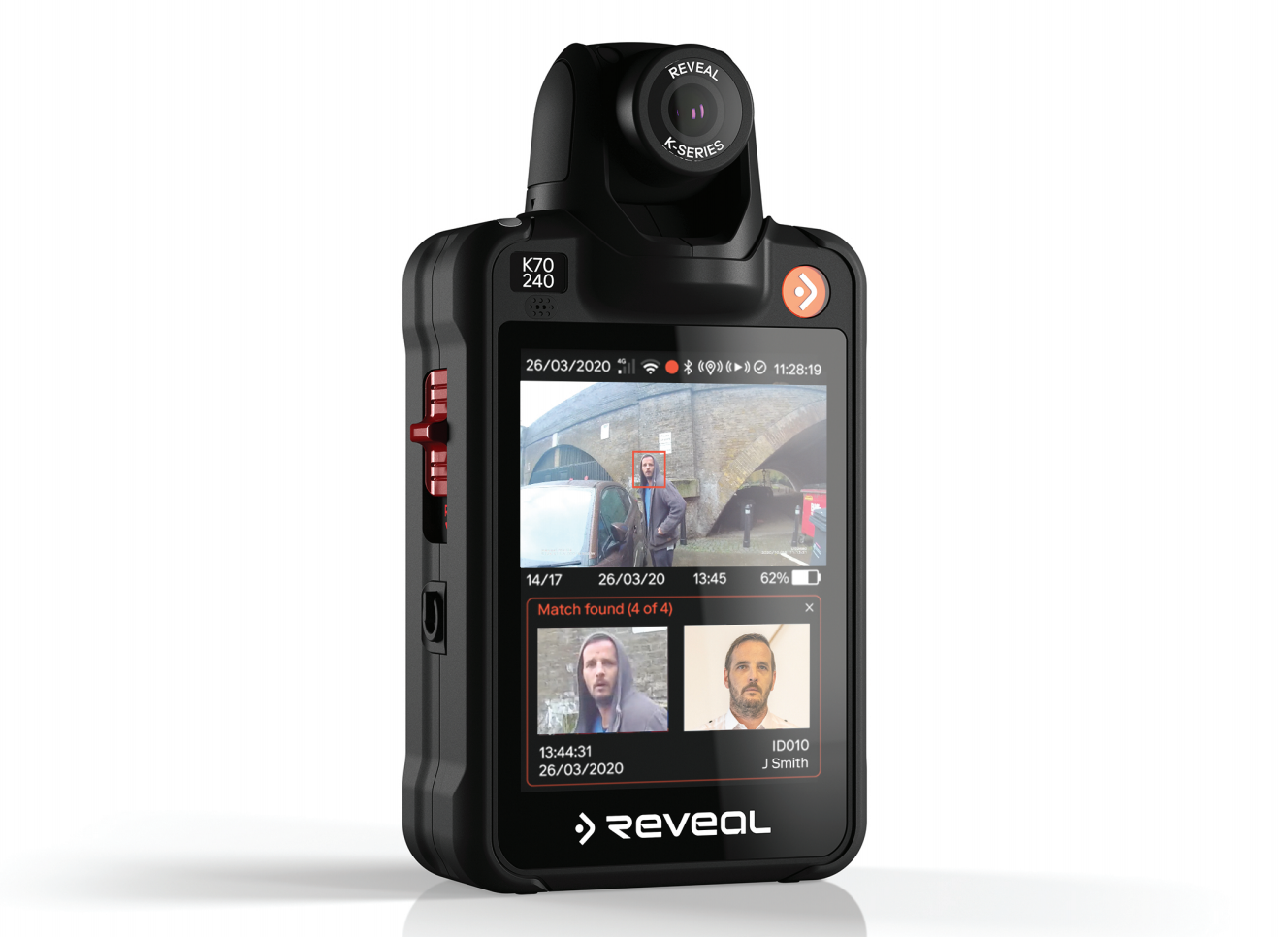The facial recognition tech that would be useless in an ideal world
Alasdair Field dropped out of uni to work as a ‘tea boy’ at Trilion Television, now he’s the head of Reveal, a leading bodycam company. He speaks to Andy Martin


Alasdair Field was supposed to be studying psychology. The reality was that he was the front man for a band that was on a stage at Glastonbury in 1984. Which, by a curious chain of circumstances, is what ultimately led him to set up Reveal, makers of bodycams, as worn by the Met Police and emergency workers around the country.
Glastonbury may have been his band’s “single claim to fame”, he says, but the experience left Field with an abiding love of the technology. Not just the guitars – of which he has several adorning his studio – but the amplifiers and mixers and recording equipment. It was a short step from there to dropping out of university and joining Trilion Television at the age of 19. “I became a techie,” says Field. “I didn’t really want to be a psychologist, anyway.”
He started out, he says, as “tea-boy”, but he was fully obsessed with perfecting audio and within a few years he was working alongside the biggest names in the music business. “It was the height of artists releasing live videos,” says Field. His job was in post-production, making the best possible sound out of the recordings they had made. He collaborated with the likes of Paul McCartney (“nice guy”), UB40 (“naughty boys”), Brian Ferry (“that suit needed a good iron”) and Tina Turner (“it was like an angel had walked into the room”).
Field then switched over to doing audio for Bernie Ecclestone and Formula One. “Without any sound it’s ridiculous,” he says. “Every circuit has a different sound.” He used zoom microphones and dashboard audio. “It was all very basic back then. We strapped a £1 mic on the chassis. It sounded like a bee in a beer can. But what I discovered was that I could think of an idea that needed inventing and get it done.”
Even though data about the engines was a closely guarded secret, he could work out the revs from the sound alone. Soon he was putting the graphics on screen showing which car had the fastest engine. “The fans ate it up. Bernie loved it – anything to get one over on the teams.” This was the first of his many inventions.
Field says he could still be doing audio for Lamborghini but for the fact that “being in F1 was a bit like being in the army: I had a lot of false confidence and no money”. This was the dotcom era, at the end of the Nineties, and Field was fascinated by the convergence of computing and media. “This was before YouTube and Netflix but you could already see that video on demand was the future.”
In a perfect world they would be of no use. But in reality there is a huge swathe of people who encounter abuse in their daily lives
He launched Reveal in 2002 and created a system for digitising video, which he sold to the Big Brother producers. “They had thousands of hours of video. They had to find a story – who was doing what to whom when – but they had to comb through it all frame by frame to find it.” Field’s indexing enabled them to access and select according to theme or character. “We were on a roll. We thought we could sell it to everyone. But people wanted to do it differently. And you can’t just redo the software to suit everyone.”
One of their first customers was the police. “Back in the day their system was so clunky and inefficient. They would take crime scene video. Then they would ferry these VHS videos around, look at it, then ferry them back again.” Reveal came in and allowed major crime divisions to share information, footage or audio files. “They could see it all at the touch of a button instead of getting on their bikes.”
They were gradually growing a customer base, but Field was still working as a freelance audio engineer at night to keep the business rolling. “We didn’t make any money for many many years.” The real breakthrough occurred when Field saw the first body cameras in 2006. “I had the right imagination to see that this would be a game-changer. So we shifted the business towards it – the obsession with the digital camera.”
The first convictions were being obtained using video footage. Reveal were sponsored by the Home Office to manage evidence. There was only one problem, says Field. “I realised I had no idea how to make a camera.” He found people in the UK who would make him one, “but they wanted a million – I could [only scrape] together a grand”.
So off he went to Hong Kong, which is where he found the right manufacturers to make him cameras to his specification “for almost no money”. Now Reveal sell their equipment to customers well beyond the police force: border control, traffic wardens, ambulance drivers, prison officers. “Anywhere where there are confrontations, or the prospect of having one. Wherever you need recorded evidence.”
One unanticipated benefit of body-worn cameras is that they have the effect of de-escalating tensions. “When people realise you’re wearing a body camera, it has a massive calming effect,” says Field. “It’s better that the situation you might need to record doesn’t even happen.”
Body cams are now being used in retail and in hospitals, notably in A&E, and in mental health, wherever you can have “irate patients” threatening staff safety. “It wasn’t about punishing the patient, it was about calming the encounter in the first place.”

The technology has come on in leaps and bounds. The first camera produced 90 minutes of footage at standard definition. The 7th generation has GPS, AI, can transmit live and can store 14 hours of recordings at high definition – and it’s all encrypted. The latest Reveal camera, about to be released, even has facial recognition. “The world is not yet ready for this,” says Field. “But we’ve gone ahead and built it anyway. If we build it, they will come.”
He acknowledges that everyone is rightly concerned about a surveillance society, “but how useful could this be in tracking down missing children or vulnerable people?” Field reckons police forces are bound to use it eventually. “It can’t be used for mass surveillance, it’s for close quarters only.” And they won’t be selling it to countries or companies that don’t fit their criteria.
“This is going to happen. Its uses are many and varied.” Field mentions several examples. Gambling addicts: “It would be voluntary. But you could say, ‘do not serve me!’” Similarly football hooligans and racists who have been excluded from football stadiums. “Stewards can’t recognise all of them. But these cameras can. You could have a watch list.” They are already working with a number of clubs. And what about Sunday football referees too? Field himself used to be a referee, so it’s a cause close to his heart. “It’s shocking what people do and get away with. This will help.”
Alasdair Field is almost sorry that his cameras are so successful. “In a perfect world they would be of no use. But in reality there is a huge swathe of people who encounter abuse in their daily lives. This stops things happening.”
Join our commenting forum
Join thought-provoking conversations, follow other Independent readers and see their replies
Comments
Bookmark popover
Removed from bookmarks